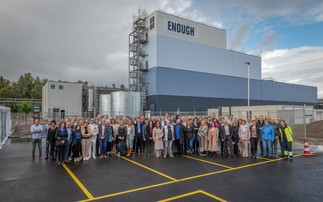Aida Greenbury of Asia Pulp and Paper explains how bottom line performance and sustainable forests can be combined to help deliver 'a green economy for Indonesia'
How do you now plan to build on the zero deforestation strategy?
The commitments have been made, but we are not simply sticking at the commitment we made in February 2013. As you know, in September 2013 we made a commitment on the last mixed natural forest wood entering our mills. Then we made an additional commitment this May around landscape forest protection and restoration. There are additional commitments made after our zero deforestation commitment and there is a lot of work still to be done. The deeper we go with this commitment the more we realise the scale of the challenges we are facing.
We have changed our narrative in the last 10 months in that we have started calling governments and other actors to help us. We have realised we are not just dealing with APP concessions and APP suppliers here. We are dealing with landscape issues, law enforcement issues, a lot of things that we can't do alone. The challenges in the future centre on those two issues.
Can you explain what those landscape issues entail?
We cannot just focus on the sustainability of our concessions and work in isolation to the rest of the landscape. We have to make sure the rest of the land use in that landscape is managed sustainably as well. I'll just give you one example, we are trying to adopt the best practice in peatland management. But peatland does not recognise concession boundaries, it can be spread across two or three landscapes. We can manage the peat sustainably in our concession, but if the rest of the players in the landscape are draining the peat or burning the peat then we will not be sustainable. This is what we are facing in south Sumatra right now. We are trying to adopt the best possible practices in our concession, but then communities around us are slashing and burning, and even lighting fires in our concession in some cases when there is open access to our concession for hunting and other activities. We have to make sure the surrounding landscape is managed in a similar way to how we are managing our concession, otherwise there is no point.
And presumably you can only do that if deforestation rules and regulations are enforced?
Correct. We've been actively talking to different parts of the government about our zero deforestation policy and providing them with information on the benefits that will result if this approach is widened. And we hope the government will be able to adopt a zero deforestation policy and enforce it in the near future.
It could be argued that Asia Pulp and Paper has been able to move to zero deforestation because it has already logged widely and created all the plantations it needs. What would be your response to those who say you have only stopped once the damage has already been done?
The damage may have been done but we have said that is enough damage done already. As we speak there are new concessions knocking on our door wanting to supply us and there is still natural forest in their concessions, but our policy still applies. The opportunity to expand is there, it's not the case that we've converted enough forest and we have enough wood so it is time to adopt the policy.
But we are also not saying we don't want to expand. Everyone knows we are building another mill in south Sumatra, a third mill in south Sumatra that will require more fibre. Our fibre stock has been audited by The Forest Trust to show we have enough plantation stock on the ground, but we do need buffers. We need buffer areas to make sure that if natural disaster destroys our plantation there is enough buffer stock to support our mill. So we were still expanding when we adopted our zero deforestation policy and we are still expanding. That means that if we didn't adopt this policy we would be going into these new concessions and destroying the natural forest.
How do you expand without converting more natural forest into plantations?
We are reviewing, and will review, all new concessions and see if they can comply with our natural forest policy. We need to identify how much natural forest is in there, how much HCV [high conservation value forest], how much HCS [high carbon stock forest], what kind of social issues are in there. Then if there are areas that are free from HCV and HCF and community rights issues then we are going to develop the area to be plantation. But any new plantation we develop in the future will need to totally adhere to our forest conservation policy.
We are trying to show to others that we can still expand without doing what we did in the past. It is possible to change. We are talking about the green economy and a green economy for Indonesia - still developing our country with as little impact on the environment as possible. We want to show that is possible.
Has this approach helped you to win back the customers that dropped APP when it was the target of Greenpeace protests?
Absolutely. Staples, for example, we started to talking to them within six months of us announcing our policy. We talked to them about how to monitor our progress and if we were succeeding how they could come back. There are a lot of other brands doing similar things. Some are more cautious than others, but generally we have seen a huge comeback after our forest conservation policy.
So, you'd argue you have been rewarded for doing the right thing?
We have received a reward, but I am not sure it is enough. There are two types of rewards, commercial agreements but also support for our policy. This goes to the New York Deforestation declaration that we supported a couple of weeks ago. A lot of companies are committed to tackling deforestation, but how are they going to walk the talk? We have been walking the talk for two or three years now, but what are other companies going to do to walk the talk? How are they going to address their past legacy? Addressing the past legacy of deforestation is not only the responsibility of producers, it is also the past legacy of consumer goods companies and other companies, because they did receive benefits from the sales of products that came from deforestation in the past. Addressing deforestation and restoration is the responsibility of everyone. That emotional, as well as commercial, support is something we are still waiting for.










